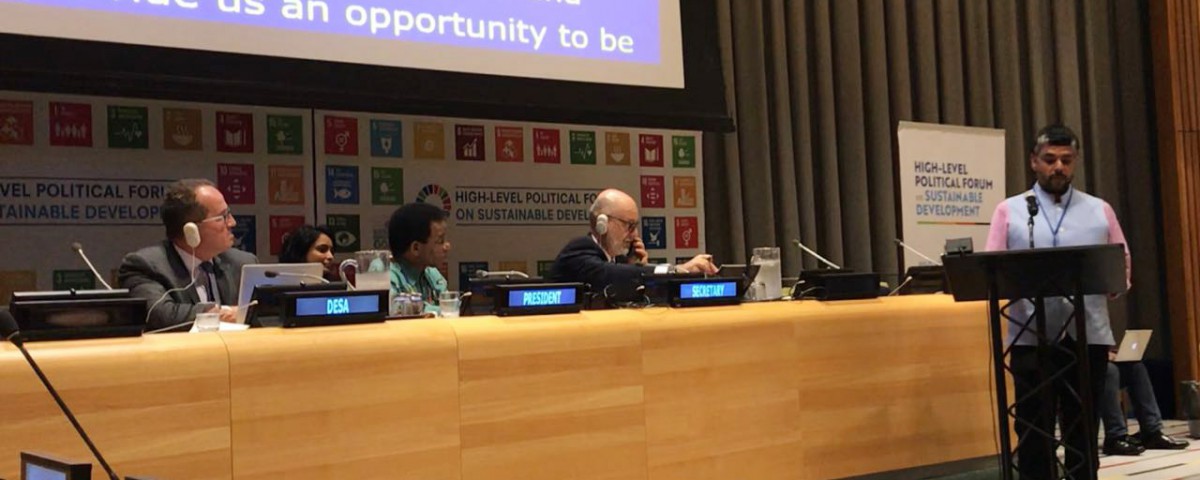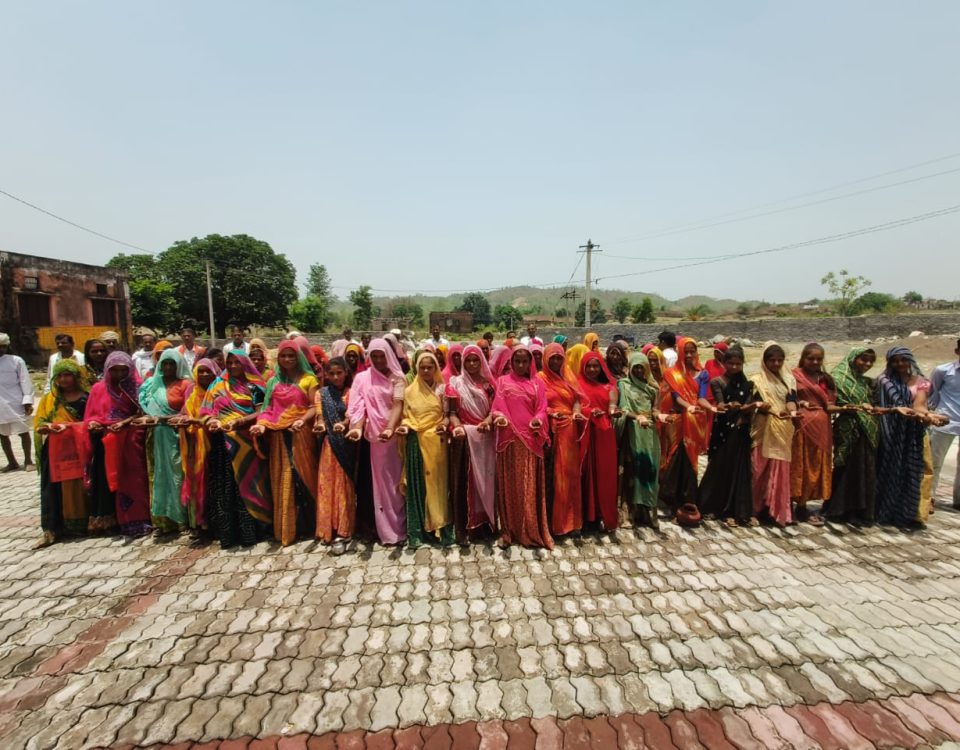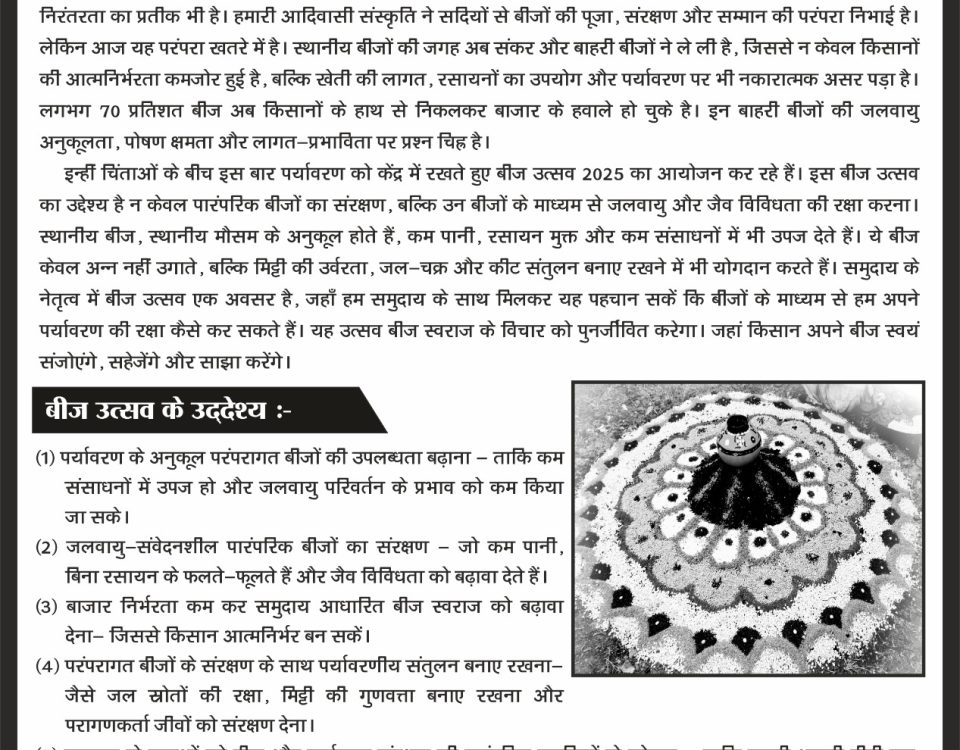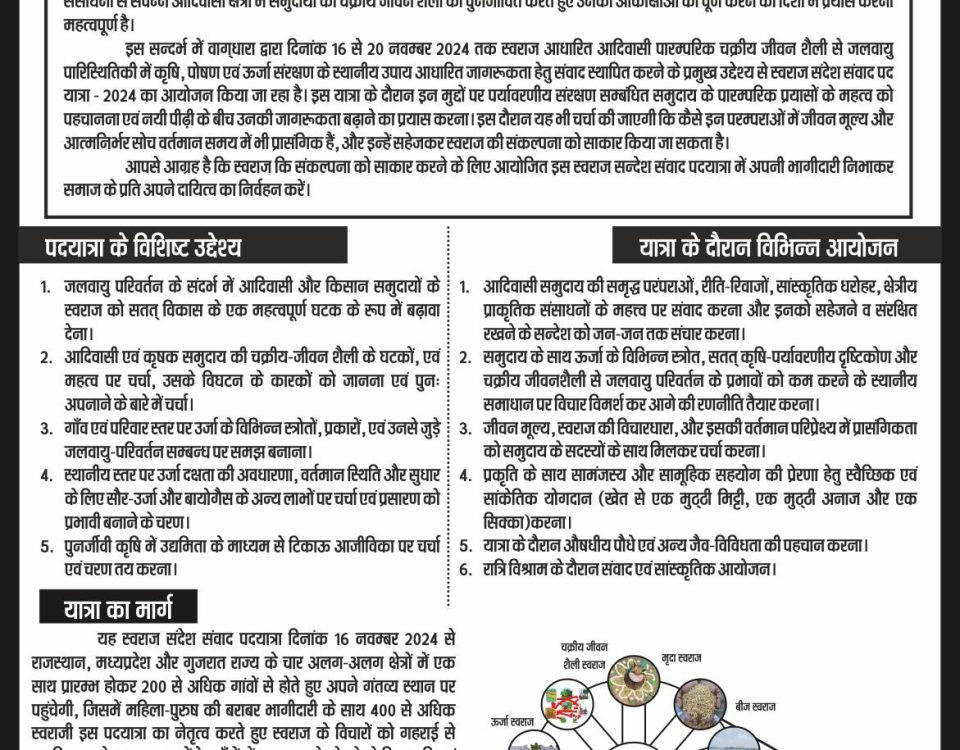Oral Statement read at the UN High Level Political Forum for Sustainable Development

Priyanka Dodiyar, a grassroots level success story
March 9, 2018
Discussion with district collector regarding child rights
September 5, 2018The voices of indigenous tribal communities and groups of Rajasthan were heard to the world from the United Nation platform. Jayesh Joshi, secretary of Vaagdhara, a Rajasthan based non-profit organization, working with tribal communities of Western India, read the ‘Oral Statement’ at UN High Level Political Forum 2018 for sustainable development. It is a matter to feel proud for Rajasthan as only 7 statements were chosen across the world to be read at the forum and Vaagdhara, a Banswara based organization, was the only one from India. Jayesh Joshi has described this as a great achievement and pride for Rajasthan.
Indicating towards the vulnerability of indigenous tribal communities of western India, it was said in the statement that “The indigenous communities in the western part of India are the most vulnerable, socially and economically deprived, though they had a rich and a glorious past. The community was once thriving because of diverse and environmentally sustainable farming practices, nutritionally rich local food and the traditional wisdom to find culturally and environmentally appropriate solutions to problems. However, the changing socio-economic, political and climatic conditions eroded their resilience to a significant extent. Once a self-sustained farming and forest based economy is now a slave to market forces for eg. Pesticides, Chemical fertilizers and genetically modified seeds. With time, farming became a non-viable occupation, thanks to increased input costs, harsh climatic conditions and loss of traditional knowledge of low cost- high nutrition farming. The rich farmers of yesterday became unemployed and migrant daily wage earners of today.”
Sharing experiences and results with traditional tribal groups regarding traditional farming and local produce, it was said in the oral statement that “During the interventions from Vaagdhara, the need to revive the lost indigenous knowledge derived from the social economic, historical and cultural practices. Community dialogues were held to discover, collect, document and disseminate the traditional knowledge within the focal groups to revive the traditional practices of the tribal communities. Documentation of the centuries old environment friendly and locally sustainable farming methods and food practices were also documented. The efforts initiated by Vaagdhara in the target area resulted in retaining the non cultivated livelihoods which uses ‘zero chemical fertilizer, zero pesticides and zero GM seeds’. Farmers today preserve and use their own seeds, make pesticides out of neem, use poultry for pest control and goatery and cows for fertilizers. This new eco-system has proved to be a culturally appropriate, low cost and climate responsive solution to their farming needs. These interventions have not only lifted them out of chronic poverty but also resulted into improved health, nutrition and educational indicators of the young generation.”
राजस्थान के जनजातीय समूहों की आवाज़ संयुक्त राष्ट्र के मंच से दुनिया भर में सुनाई दी। संयुक्त राष्ट्र के हाई लेवल पॉलिटिकल फोरम 2018 में राजस्थान समेत पश्चिमी भारत के जनजातीय समुदायों के साथ काम कर रहे राजस्थान के गैर लाभकारी संगठन वाग्धारा के सचिव जयेश जोशी ने ओरल स्टेटमेंट पढा। संयुक्त राष्ट्र की ओर से पूरे विश्व में सिर्फ 7 स्टेटमेंट ही फोरम पर पढ़ने के लिए चुने गए थे, जिनमें राजस्थान के बांसवाड़ा स्थित संस्था वाग्धारा, भारत से एकमात्र चुनी गई प्रतिभागी संस्था रही। वाग्धारा के सचिव जयेश जोशी ने इसे राजस्थान के लिए एक बड़ी उपलब्धि और गर्व की बात बताया।
हाई लेवल पॉलिटिकल फोरम, सतत विकास के लिए संयुक्त राष्ट्र का प्रमुख मंच है और वैश्विक स्तर पर 2030 के सतत विकास लक्ष्यों की समीक्षा और फॉलो अप में इसकी केंद्रीय भूमिका है। फोरम की वार्षिक बैठक संयुक्त राष्ट्र की आर्थिक और सामाजिक परिषद के तहत होती है।
अपने ओरल स्टेटमेंट में जयेश जोशी ने पर्यावरण के अनुकूल और टिकाऊ खेती को प्रोत्साहन देने के लिए संयुक्त राष्ट्र से अपील की। साथ ही खेती के पारंपरिक ज्ञान को मान्यता देते हुए रासायनिक उर्वरकों, कीटनाशकों के उपयोग को रोकने या पूरी तरह से बंद करने के साथ ही मृदा संरक्षण को बढ़ावा देने और आदिवासी समूहों की क्षमताओं को बढ़ाने के उद्देश्य से उन्हें खेती में आत्मनिर्भर बनाने में मदद देने पर जोर दिया।
भारत के जनजातीय समुदायों की आवाज़ का प्रखर प्रतिनिधित्व करते हुए इस स्टेटमेंट में कहा गया कि “भारत के पश्चिमी हिस्से में स्वदेशी समुदाय सबसे कमजोर, सामाजिक और आर्थिक रूप से वंचित हैं, हालांकि उनके पास एक समृद्ध और गौरवशाली अतीत था। उस समय ये लोग विविध और पर्यावरणीय रूप से टिकाऊ कृषि पद्धतियों, पौष्टिकता से भरपूर स्थानीय भोजन और सांस्कृतिक और पर्यावरण संबंधी समस्याओं के समाधान के लिए पारंपरिक ज्ञान से संपन्न थे। लेकिन बदलते सामाजिक-आर्थिक, राजनीतिक और जलवायु परिस्थितियों ने उनकी हालत खराब कर दी। कभी आत्मनिर्भर रही खेती और वन आधारित अर्थव्यवस्था अब बाजार की ताकतों का गुलाम हो गई है जैसे कि रासायनिक कीटनाशक, रासायनिक उर्वरक और आनुवंशिक रूप से संशोधित बीज। समय के साथ, खेती एक घाटे का सौदा हो गई है और पारंपरिक ज्ञान के नुकसान के चलते कल तक जो समृद्ध किसान थे वो आज बेरोजगार और प्रवासी दिहाड़ी मजदूर बन गए हैं।”
पारंपरिक खेती और स्थानीय उपज को लेकर जनजातीय समूहों के साथ अपने अनुभव और परिणामों को साझा करते हुए ओरल स्टेटमेंट में बताया गया कि वाग्धारा ने आदिवासी समूहों के पारंपरिक तरीकों को पुनर्जीवित करने के लिए सामुदायिक संवाद के जरिए पारंपरिक ज्ञान को तलाशा और दस्तावेज के रूप में संकलित करने के बाद समुदायों के बीच प्रसारित भी किया। “वाग्धारा के प्रयासों के परिणामस्वरूप क्षेत्र के किसान 'शून्य रासायनिक उर्वरक, शून्य कीटनाशकों और शून्य जीएम बीज' का उपयोग करते है। यहां के किसान आज अपने खुद के उपजाए बीज को संरक्षित और उपयोग करते हैं। कीटनाशक के तौर पर नीम का उपयोग तथा कीट नियंत्रण और उर्वरकों के लिए गाय, बकरी और मुर्गों का उपयोग करने लगे हैं। यह नई पर्यावरण मित्रपूर्ण प्रणाली उनकी कृषि आवश्यकताओं के लिए सांस्कृतिक रूप से उपयुक्त, कम लागत और जलवायु अनुकूल समाधान साबित हुई है। इन प्रयासों से न केवल उनकी आर्थिक दशा सुधरी है, बल्कि नई पीढ़ी के स्वास्थ्य, पोषण और शैक्षिक संकेतकों में भी सुधार हुआ है।”
Subscribe to our newsletter!





